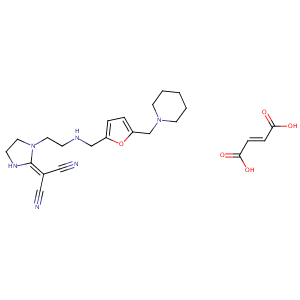Drug Information
| Drug General Information | Top | |||
|---|---|---|---|---|
| Drug ID |
D08ZRR
|
|||
| Former ID |
DIB006016
|
|||
| Drug Name |
KW-5092
|
|||
| Synonyms |
Propanedinitrile, (1-(2-(((5-(1-piperidinylmethyl)-2-furanyl)methyl)amino)ethyl)-2-imidazolidinylidene)-, (E)-2-butenedioate (1:1); Propanedinitrile, (1-(2-(((5-(1-piperidinylmethyl)-2-furanyl)methyl)amino)etyhyl)-2-imidazolidinylidene)-, (E)-2-butenedioate (1:1); 135017-85-5; C19H26N6O.C4H4O4; AC1O5RKQ; LS-120041; (1-(2-(((5-(piperidinomethyl)-2-furanyl)methyl)amino)ethyl)-2-imidazolidinylidene)propanedinitrile fumarate
Click to Show/Hide
|
|||
| Drug Type |
Small molecular drug
|
|||
| Indication | Pain [ICD-11: MG30-MG3Z] | Phase 1 | [1] | |
| Structure |
 |
Download2D MOL |
||
| Formula |
C23H30N6O5
|
|||
| Canonical SMILES |
C1CCN(CC1)CC2=CC=C(O2)CNCCN3CCNC3=C(C#N)C#N.C(=CC(=O)O)C(=O)O
|
|||
| InChI |
1S/C19H26N6O.C4H4O4/c20-12-16(13-21)19-23-7-11-25(19)10-6-22-14-17-4-5-18(26-17)15-24-8-2-1-3-9-24;5-3(6)1-2-4(7)8/h4-5,22-23H,1-3,6-11,14-15H2;1-2H,(H,5,6)(H,7,8)/b;2-1+
|
|||
| InChIKey |
ULJCVCIVEVXIKD-WLHGVMLRSA-N
|
|||
| CAS Number |
CAS 135017-85-5
|
|||
| PubChem Compound ID | ||||
| Target and Pathway | Top | |||
|---|---|---|---|---|
| Target(s) | Acetylcholinesterase (AChE) | Target Info | Inhibitor | [1] |
| KEGG Pathway | Glycerophospholipid metabolism | |||
| Cholinergic synapse | ||||
| Panther Pathway | Muscarinic acetylcholine receptor 1 and 3 signaling pathway | |||
| Muscarinic acetylcholine receptor 2 and 4 signaling pathway | ||||
| Nicotinic acetylcholine receptor signaling pathway | ||||
| Pathwhiz Pathway | Phospholipid Biosynthesis | |||
| Pathway Interaction Database | ATF-2 transcription factor network | |||
| WikiPathways | Monoamine Transport | |||
| Biogenic Amine Synthesis | ||||
| Acetylcholine Synthesis | ||||
| Integrated Pancreatic Cancer Pathway | ||||
| References | Top | |||
|---|---|---|---|---|
| REF 1 | Oral administration of KW-5092, a novel gastroprokinetic agent with acetylcholinesterase inhibitory and acetylcholine release enhancing activities, causes a dose-dependent increase in the blood acetylcholine content of beagle dogs. Neurosci Lett. 1997 Mar 28;225(1):25-8. | |||
If You Find Any Error in Data or Bug in Web Service, Please Kindly Report It to Dr. Zhou and Dr. Zhang.

